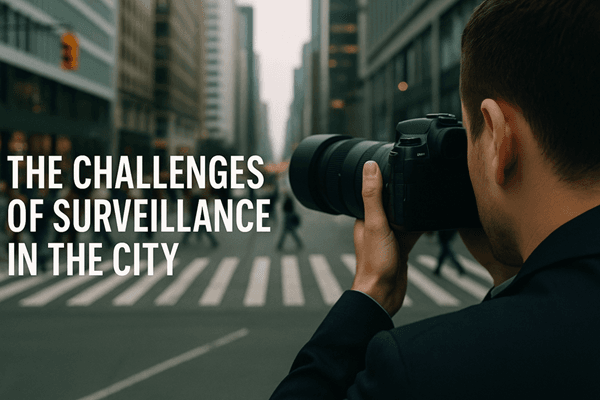A big part of private investigators’ workloads is surveillance, whether that’s being employed by an individual who wants to know if their partner is cheating on them, or by a business that wants to find out if their employee really does have that injury they’re repeatedly calling in sick over.
No single surveillance case is ever the same, each has its nuances and variables. Location always plays a part, and there are some consistent challenges to carrying out surveillance in a city, that you might not experience in suburban or rural areas.
Let’s take a look.
Identifying a target
Probably the most obvious challenge of carrying out surveillance in a city compared to a less densely-populated area are just in identifying the target, because there are more people.
Seems obvious, right? But it does make things harder and it does increase the time it takes, even if an investigator has a good tip on where to find their subject and at what time.
The fact that you’re often dealing with crowds of hundreds or even thousands of people, depending on the particular location, can slow down your initial search until you have the target in sight and can begin your surveillance work.
A good private investigator will always try to account for this in advance by gaining as much information from their client as possible on identifying features, and the most optimum times and places to carry out that surveillance.
But say, for example, the client is someone who wants proof that their ex is living with someone, in violation of a child support order that states they live alone. In a suburban area, it’s much easier to identify the comings and goings in a house, than it is in an apartment block in a city centre.
Losing a target
Equally, losing a target is more of a risk in a city because of the crowds and the many options for someone to get around the city quickly and easily.
Most of the biggest cities in the UK have several public transport options, for example; buses, taxis, trains but also a tram or underground transport system.
If a PI is following someone, and then they suddenly hop onto a tram or down into an underground when not expected, it can be very hard to keep up and maintain contact.
Or there are just busy shopping areas that someone could disappear into, such as department stores or shopping centres where the crowds intensify and it’s easy to lose sight of someone, and within the masses it may not be possible to find them again, meaning a failed attempt.
For that reason, a private investigator must be ready to act quickly once they do establish visual contact with a subject, and they should be aiming to do so in a key location.
Carrying out surveillance on a suspected cheating partner from the moment they leave work on their way to meet their ‘bit on the side’ is likely a waste of time as the subject could be lost, instead, identifying the bars or hotels they tend to frequent, and setting up a base near there, is more effective and efficient.
Bystander interference
A good private investigator will always blend into the background of a location, so that their subject doesn’t know they’re being followed or filmed. However, in a busy city location, such as Manchester, there are more people than just the subject, and those people can sometimes be a challenge!
We’ve covered already crowds, but it’s more than that. You might get bystanders who interact with you, asking you for directions or just talking to you while you’re trying to do your job.
If you’re using filming equipment then you might even get people challenging you, asking you what you’re doing, why you’re filming people etc. They think they’re doing good, but all they’re doing is stopping you from carrying out your work!
It’s not a super-common issue, but if it does happen it can range from an inconvenience to something that completely jeopardises your work. If someone thinks you’re acting suspicious and decides to get loud about it, you’re going to have to abandon the work for now and regroup.
Challenges can be overcome
None of these hurdles are deal-breakers, they simply reinforce the need for smart planning and quick thinking. Even in the most chaotic city environment, a well-prepared investigator can turn the tables and stay one step ahead.
But this is all something that should be addressed when you’re having your initial consultations. If you hire a PI for a job that’s going to include city work, then they should be discussing these challenges with you, and working out the most effective way to carry out the task at hand bearing those in mind.
If they don’t, then clients are at risk of receiving poor service. A bad investigator might use these challenges as excuses for a failed attempt, and then invoice for more hours of work for attempts 2, 3 and so on…
A trustworthy investigator will plan around these challenges as best as possible, and also be upfront with the client about them and what budget considerations need to be made because of them, so at least the client understands the circumstances and can mutually agree a plan they’re comfortable with.
If you’re looking for help from a private investigator that you know will likely entail surveillance in an urban environment, whether that’s a major city or even just a busy town, give EJM Investigations a call on 01772 334700 and we’ll happily explore the best plan of action with you.

